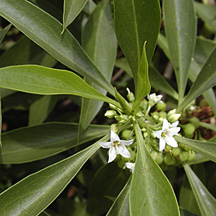
|
In the Garden
|
Naio has sandalwood
fragrance
(False sandalwood)
Myoporum sandwicense
Description: Depending on which island you are on, naio can take the form of a prostrate ground cover, such as naio papa at South Point on the Big Island; or a fairly large shrub (8 to 10 feet tall), as in other coastal localities on most islands; or a tree (50 to 80 feet tall), as in the upper dry forests and sub-alpine regions of Maui and the Big Island. These forms will usually have glossy, dark green leaves 1 to 8 inches long and 1 to 2 inches wide.
![]()

Naio was shipped to Asia as a substitute for sandalwood when sandalwood became scarce. It's available at Home Depot for about $5.
All the plants have small, whitish-pink flowers about a half-inch in diameter that emit a spicy sandalwood fragrance. Once pollinated, the flowers develop into small, fleshy, white fruit containing a single hard seed.
Distribution: This indigenous plant is found in the coastal dry forest up to the sub-alpine dry forest on all islands except Kahoolawe. On Oahu it is primarily found around Kaiwi (Allen Davis), Kaena and Kalaeloa (Barbers Point).
Cultural uses: The hard wood was used in constructing houses, spears and other smaller tools.
Landscape uses and care: This hardy plant thrives in full sun with minimal watering. It does well as a specimen plant or as a medium-size hedge. Few pests bother it, thus pesticides are usually unnecessary. Naio is also used in soil bioremediation. Studies have shown it breaks down petroleum-based substances in the ground.
Tasty tidbit: This plant is also known as bastard sandalwood. It was used to fill orders of sandalwood to Asia when sandalwood became scarce. Its fragrance resembles sandalwood when cut or burned, but it doesn't retain the scent as long.
nativehawaiianplants.com
![]()
E-mail to Features Desk
[News] [Business] [Features] [Sports] [Editorial] [Do It Electric!]
[Classified Ads] [Search] [Subscribe] [Info] [Letter to Editor]
[Feedback]
